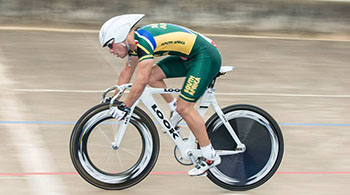
Juan Odendaal
Photo: BOOGS Photography, Andrew McFadden |
UFS’s athletes with disabilities are currently excelling in cycling and athletics.
The UFS Para-cyclist, Juan Odendaal, will soon make his debut for South Africa at the 2015 Union Cyclist International (UCI) Para-cycling Track World Championships in Apeldoorn, The Netherlands, from 26-29 March 2015.
The Championship event will provide an excellent foundation for re-building the international competitiveness of South Africa’s Para-cycling track team in the build-up to Rio 2016. In a situation where the UCI has hosted relatively few international track competitions over the past three years, the 2015 World Championships will serve as a stepping-stone to the 2016 grand season, when it is expected that the country’s top riders will reach their peak competitive condition.
As the youngest member of the South African team, Odendaal will use the opportunity of competing in the individual time trial and team sprint events to build a platform for an international career will certainly span many years to come.
Another UFS student, Musa Simelane, are excelling and was chosen for the SA Wheelchair Rugby tean, known as the "Wheelboks". They will compete in the 2015 World Wheelchair Rugby Challenge in London in October and after that head to Japan to compete in the 2015 Asia Oceania Championships.
On a local level, earlier in March this year, other UFS athletes with disabilities also performed well on the athletics track.
Blind athlete and member of the Bloemfontein Campus Student Representative Council (SRC), Louzanne Coetzee, also had a good 1500m race in the beginning of March when she qualified easily for the World Championships, which will take place in Toronto, Canada, later this year. Coetzee and her guide, Rouxné Jacobs, set up a time of 5:45.86, which is well under the required standard of 6 minutes.
The other blind UFS athlete, Danie Breitenbach, alongside his guide Marius Wessels, broke his own national record for the 800m again on Friday 6 March 2015. In November 2014, Breitenbach’s record stood at 2:15.17. This record now stands at 2:13.57. Chances now are that Breitenbach will reach his goal of running the 800m under 2:10 at the Nedbank National Championship for the Physically Disabled at the end of March 2015.
The other Kovsie stars who will be participating at the Nedbank National Championship for the Physically Disabled are as follows:
Athletes:
• Dineo Mokhosoa
• Louzanne Coetzee
• Danie Breitenbach
• Juanré Jenkinson
• Diederich Kleynhans
• Jacques de Bruyn
Swimmer:
• Johann van Heerden